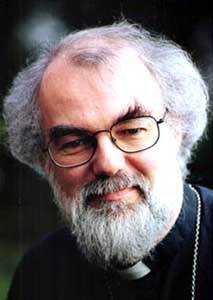-
- U.S. Episcopalians approve first openly gay bishop
- AIDS making a comeback in the U.S.
- Episcopal leaders deem same-sex union ceremonies acceptable
- Young lesbian’s stabbing death far from resolved
- NGLTF leader warns of backlash at annual Dignity meeting
- Group founded by gay bishop creates ‘safe space’ for teens
- Editor of GLBT paper appeals censorship ruling
- Probe continues into phone message accusing Arizona governor of gay agenda
- National News Briefs
- World News Briefs
national
Episcopal leaders deem same-sex union ceremonies acceptable
Head of Anglican Church plans meeting to restore church unity
Published Thursday, 14-Aug-2003 in issue 816
MINNEAPOLIS (AP) — Gay advocates in the Episcopal Church leave their national meeting with two victories — approval of the first openly gay bishop and an affirmation that same-sex blessing ceremonies are “an acceptable practice in the church.”
The measure on same-sex unions was not what advocates had hoped. Bishops rejected creating an official liturgy for the ceremonies.
But both gays and their conservative opponents agree that the measure, which received final approval the day before the convention was to end, signaled broader acceptance of homosexuality in the denomination.
Even as Episcopalians were winding up their meeting in Minneapolis, Archbishop of Canterbury Rowan Williams, head of the worldwide Anglican Communion, announced Aug. 8 that he would hold a meeting of church leaders in October to try to restore unity in the wake of the U.S. church’s decision to accept a gay bishop. The communion is the British-based global association of churches that includes the Episcopal Church.
The Rev. Francis Wade, head of the liturgical committee that wrote the convention’s document on same-sex ceremonies, said he interpreted the measure to mean that dioceses conducting such ceremonies “are operating within the parameters of the understanding of this church and its doctrine and discipline.”
Wade’s explanation marks a reversal from how several bishops viewed the document when they approved it on Aug. 6. Those bishops had described the statement as only an acknowledgment that same-sex unions are being blessed in local dioceses — not an endorsement.
The Episcopal gay advocacy group Integrity said, “We understand the language clearly to give national license” to the ceremonies.
The Rev. Kendall Harmon, a leading conservative who lobbied against the document, said what “seems like a compromise” actually isn’t.
“Let’s be honest. This is authorization,” Harmon said. “It sanctions homosexual behavior.”
The House of Bishops approved the measure first, on a voice vote Aug. 6. They cut from the original proposal a plan to draft standard language for the ceremonies for an official church prayer book.
Many said they wanted to weaken the measure out of concern for church unity following the contentious confirmation of openly gay Rev. V. Gene Robinson as New Hampshire’s bishop.
The House of Deputies, a legislative body comprised of clergy and lay people, approved the amended version of the document Aug. 7.
The deputies used a complex voting procedure that required clergy and lay people in diocesan delegations to cast separate ballots. The measure needed a majority of votes in each delegation to win. In the combined results, 120 delegations voted yes and 72 voted no. The votes of 24 delegations were not counted because their members were divided.
The document said, “We recognize that local faith communities are operating within the bounds of our common life as they explore and experience liturgies celebrating and blessing same-sex unions.”
Bishop Mark Sisk of New York was among those who interpreted the measure as simply an acknowledgment of the different approaches to same-sex blessings in each diocese.
Three bishops — in Kansas, New Hampshire and Delaware — authorize same-sex blessings, according to the Rev. Michael Hopkins, president of Integrity. Other dioceses bar them, while some bishops have a “don’t ask, don’t tell” approach, overlooking the ceremonies priests perform.
“I’m sure some people will understand this to be an authorization. I don’t believe that is what the intention of the resolution was,” Sisk said. “It carefully steps back from saying we authorize. It says we recognize.”
But Wade said it affirms the blessings as “within the bounds” of church teaching and an “acceptable practice in the church.”
It is unclear what impact — if any — the measure will have. Bishops now decide whether to permit same-sex blessing ceremonies in their local parishes and they retain what church leaders call that “local option.”
That is a key provision for conservatives, who fear the church will create a mandatory same-sex blessing ceremony that will force them to offer the rite in their parishes.
|
|
Copyright © 2003-2025 Uptown Publications


